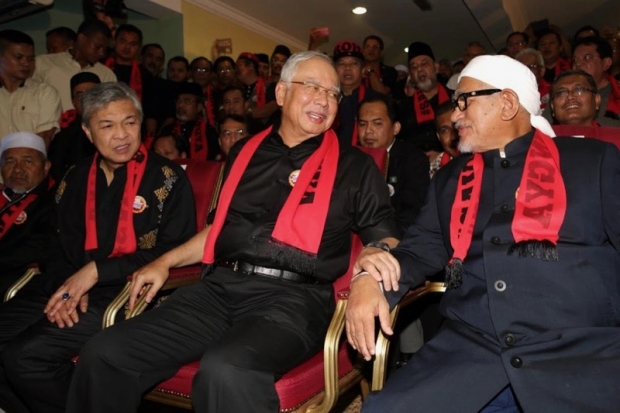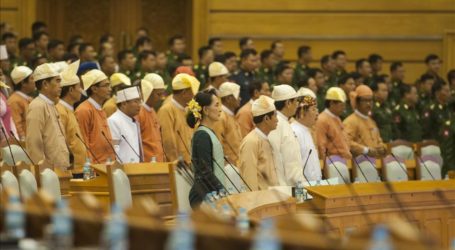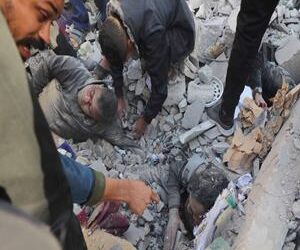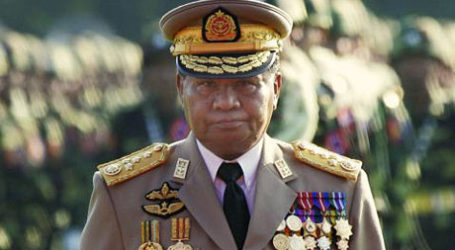Myanmar Halts Sending Workers to Malaysia amid Tension


Prime Minister Datuk Seri Najib Razak (C)) at a rally in support of the Rohingyas in Kuala Lumpur Dec. 4, 2016 — File pic.
Yangon, Myanmar, 08 Rabi’ul Awwal 1438/08 December 2016 (MINA) – Myanmar has suspended sending workers to Malaysia amid rising tension between the countries over conflicts in Myanmar’s troubled Rakhine State.
An official from the Myanmar Overseas Employment Agencies Federation (MOEAF) confirmed Wednesday that the labor department ordered the body Tuesday to temporarily halt the deployment of migrant workers to Malaysia starting Tuesday due to safety concerns.
Since last month, Malaysia has criticized Myanmar’s government and military over violence against Rohingya Muslims in Rakhine — which Prime Minister Najib Razak and his cabinet have called “genocide” or “ethnic cleansing” — while Myanmar has accused Malaysia of meddling in its internal affairs.
On Sunday, thousands of people — including several Malaysian politicians — attended a government-organized demonstration in Kuala Lumpur to demand an end to violence against the Rohingya community.
Hundreds of people joined a rally in Myanmar’s largest city Yangon against the Malaysian government that same day, and a group of Muslim civil societies in Myanmar — including aid group Social Alliance — has since delivered an open letter to Malaysia’s embassy warning that such moves “could further worsen the already difficult situation”.
The MOEAF’s secretary, Win Tun, told Anadolu Agency Wednesday that Myanmar workers no longer preferred Malaysia for employment opportunities.
“The number of Myanmar workers [who want to work in Malaysia] has been declining since 2013,” he said by phone.
“It declined by half this year compared to last year.”
Myanmar needs more international cooperation.
Some 50,000 workers had returned to Myanmar in 2014 after more than 24 of their countrymen were killed in Malaysia during a 15-month period leading up to September 2014, in what observers believe could have been linked to communal violence in Rakhine, according to reports in Malaysian media.
According to Myanmar’s embassy in Kuala Lumpur, there are more than 400,000 Myanmar migrant workers in Malaysia, around 100,000 of who are illegal workers.
According to some estimates, however, the number of undocumented Myanmar workers in the country stands at around 500,000.
Among those illegally employed, many find themselves working long hours in dangerous conditions with few avenues for gaining better conditions or payment.
Malaysia also hosts more than 54,000 Rohingya and 5,200 ethnic Rakhine refugees registered with the United Nations, and its last census in 2014 showed there were some 135,000 Rohingya in the country.
After an emergency meeting in Myanmar’s political capital Nay Pyi Taw on Tuesday, the ministry of labor, immigration and population released a statement saying the suspension of sending workers to Malaysia was due to the current situation in the neighboring country.
Last week, State Counselor Aung San Suu Kyi insisted that Myanmar’s government wants to make the relationship between ethnic Rakhine Buddhists and the Muslim minority “better”, but accused the international community of not adopting a constructive stance on the “highly sensitive and delicate” issue.
“But I would appreciate it so much if the international community would help us to maintain peace and stability and to make progress in building better relations between the two communities instead of always drumming up calls for, well, for bigger fires of resentment, if you like,” she told Channel News Asia in an interview in Singapore.
“I’m not saying there are no difficulties, but it helps if people recognize the difficulty and are more focused on resolving these difficulties rather than exaggerating them so that everything seems worse than it really is,” she added.
Former UN chief Kofi Annan, who chairs an advisory commission on Rakhine that visited the state amid ongoing military operations launched after fatal attacks on police in October, underlined Tuesday that Myanmar needs more cooperation from the international community.
“International cooperation is critical in resolving the issues,” he told a press conference in Yangon after visiting Rakhine’s Maungdaw area, where anywhere between 74 and 400 Rohingya have died since Oct. 9.
The nine-member commission’s second visit to the region this year came on the back of Oct. 9 attacks, during which nine police officers were killed by armed individuals near the Bangladesh border.
Since the deaths, soldiers have been accused of numerous human rights violations — including sexual assaults — in the area as they conduct clearance operations.
Rohingya advocacy groups claim around 400 Rohingya have been killed in military operations in Rakhine’s north since Oct. 9, while Myanmar says just 91 — 17 soldiers and 74 alleged “attackers” (including four who reportedly died during interrogation) — have been killed.
Humanitarian outfits have called for an independent probe into the initial attacks, the ongoing operations and reported rapes and rights abuses in Rakhine, as with the area placed under military lockdown, rights groups and international reporters have been unable to enter.
Last week, the UN Special Adviser on the Prevention of Genocide expressed alarm at reports of the deteriorating security, human rights and humanitarian situation in the area.
In a statement, Adama Dieng said, “the current restrictions on access to northern Rakhine State, which prevent verification of the allegations, are contributing to suspicion and alarm.” (T/R07/R01)
Mi’raj Islamic News Agency (MINA)






